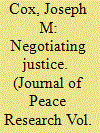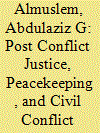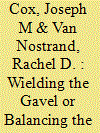|
|
|
Sort Order |
|
|
|
Items / Page
|
|
|
|
|
|
|
| Srl | Item |
| 1 |
ID:
175809


|
|
|
|
|
| Summary/Abstract |
A woman takes on work repairing cell phones in a small town in the southern governorate of Lahj. In Aden, an ‘aqīla (neighborhood representative) refuses to authorize the marriage of an underage girl. In a rural village outside of Sana'a, women petition the shaykh for permission to build a community center in which they can market home crafts to other women. Young women and men in Ibb and in Hadramawt work as volunteer teachers and coordinate with very different municipal authorities to ensure children can learn. And in the divided city of Taiz, a youth organization trains internally displaced Yemenis in the maintenance of the solar technologies that are keeping the city running.
|
|
|
|
|
|
|
|
|
|
|
|
|
|
|
|
| 2 |
ID:
173900


|
|
|
|
|
| Summary/Abstract |
Post-conflict justice is an integral component in maintaining stability and building peace in the aftermath of civil conflict. Despite its instrumental function, scholars routinely find that policymakers’ choice of justice is shaped by the structural conditions of the post-conflict environment, with outright victories leading to retributive forms of justice and negotiated outcomes yielding restorative forms of justice. However, existing literature conflates ceasefires and peace agreements into a single phenomenon, thereby overlooking the independent effects of each outcome. Leveraging the dual sovereignty framework, this article argues the conflation of negotiated outcomes is problematic because peace agreements and ceasefires generate different post-conflict environments. Relative to ceasefires, peace agreements lead to a reduction in the degree of dual sovereignty because they resolve a conflict’s incompatibility, thereby encouraging efforts to move society beyond war through restorative forms of justice. Due to the persistent threat of recurrent war generated by high levels of dual sovereignty, policymakers following ceasefires will be inclined to pursue retributive forms of justice that may target political opponents or potential defectors to bolster organizational strength. Statistical analyses confirm the underlying expectation that ceasefires and peace agreements yield different post-conflict justice outcomes. Peace agreements, relative to ceasefires, are more likely to be followed by the implementation of amnesties and reparations, whereas ceasefires exhibit a greater probability of yielding purges in the post-conflict environment.
|
|
|
|
|
|
|
|
|
|
|
|
|
|
|
|
| 3 |
ID:
171971


|
|
|
|
|
| Summary/Abstract |
This article studies how when post-conflict justice works alongside a peacekeeping operation following a civil conflict, a two-pronged pacifying effect is activated. While justice mechanisms deal with the factors underlying the conflict, peacekeepers increase the costs for the potential spoilers of the peace while also supporting the justice processes. The findings in this study have important implications for conflict-ridden states attempting to escape the ‘conflict trap’.
|
|
|
|
|
|
|
|
|
|
|
|
|
|
|
|
| 4 |
ID:
188921


|
|
|
|
|
| Summary/Abstract |
This study analyzes the institutional variation across domestic legal systems, with a focus on common law system’s adherence to precedent and reduced recourse to judicial deference, as well as on the degree of independence afforded to courts. These institutional qualities of judiciaries provide the opportunity for courts to play a more active role in the implementation of post-conflict justice, increasing uncertainty for other policymakers concerning the ultimate contours of post-conflict justice processes. To reduce such uncertainty, policymakers ensconced in these types of institutional contexts will be less likely to implement post-conflict justice. Using data from the Post-Conflict Justice dataset, we find that states with common law systems are less likely to pursue and implement post-conflict justice compared to states with civil or Islamic law systems. Moreover, independent courts will be less likely to pursue mixed or restorative forms post-conflict justice, though the impact of judicial independence is weak overall.
|
|
|
|
|
|
|
|
|
|
|
|
|
|
|
|
|
|
|
|
|